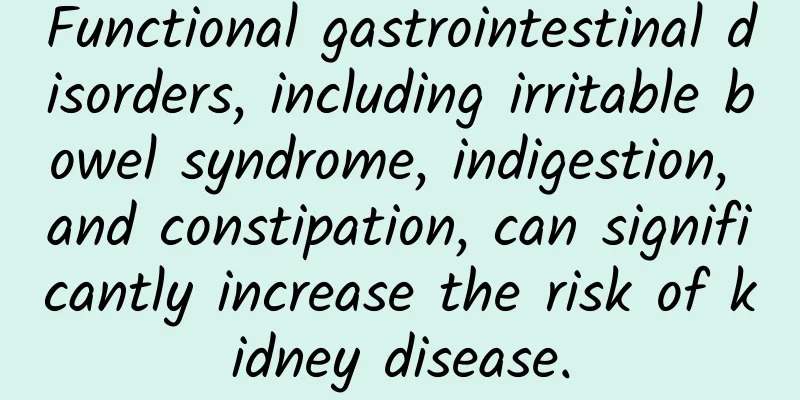Functional gastrointestinal disorders, including irritable bowel syndrome, indigestion, and constipation, can significantly increase the risk of kidney disease.

|
Functional gastrointestinal disorders (FGIDs) are a group of conditions characterized by chronic gastrointestinal symptoms such as abdominal pain, dysphagia, dyspepsia, diarrhea, constipation, and bloating, with no obvious pathological, anatomical, or physiological abnormalities on routine examination. The most common subtypes of FGIDs include irritable bowel syndrome (IBS) and functional dyspepsia. FGIDs are very common, with a global prevalence of 40%, accounting for 12% of primary care workload and 30% of gastroenterology outpatient consultations. Notably, psychiatric disorders such as depression and anxiety often coexist with FGIDs in clinical practice due to some common risk factors that affect the function of the gut-brain axis, including genetic, physiological, and psychosocial factors. As previous studies have shown that conditions such as depression and anxiety are positively associated with the risk of chronic kidney disease (CKD), we speculated that FGIDs may also be a risk factor for incident CKD, and the association between the two may be partially mediated by mental health . In order to verify the above hypothesis, the National Clinical Research Center for Kidney Diseases of Nanfang Hospital, Southern Medical University, carried out relevant work, and the research results were recently published in the Chinese Medical Journal . The study found that participants with FGIDs had a significantly increased risk of CKD, and this association could be partially explained by mental health scores. Professor Qin Xianhui of the National Clinical Research Center for Kidney Diseases of Nanfang Hospital, Southern Medical University is the corresponding author of the article, and Dr. Liu Mengyi is the first author. The study included more than 410,000 middle-aged and elderly participants from the UK Biobank study who did not have chronic kidney disease at baseline. Patients with FGIDs (including IBS, dyspepsia and other functional bowel disorders (mainly constipation)) were the exposed group, and non-FGID subjects were the non-exposed group. At baseline, 33,156 participants were diagnosed with FGIDs, including 20,987, 8,253, and 6,419 subjects diagnosed with IBS, dyspepsia, and other FIDs, respectively. During an average follow-up of 12 years, 11,001 participants were newly diagnosed with CKD. The study showed that: (1) Compared with participants without FGIDs, participants with FGIDs had a 36% increased risk of CKD, participants with IBS had a 27% increased risk of CKD, participants with dyspepsia had a 30% increased risk of CKD, and participants with other functional intestinal disorders (mainly constipation) had a 60% increased risk of CKD; (2) Mediation analysis showed that mental health scores mediated 9.05% of the association between FGID and CKD, and 13.97%, 8.27% and 5.63% of the association between IBS, dyspepsia and other functional intestinal diseases and CKD, respectively. (3) Among participants with a higher genetic risk of CKD, FGIDs and their subtypes had a stronger association with the risk of incident CKD (Figure 1). Figure 1 Association of FGIDs and their subtypes with the risk of CKD in subjects with different genetic risks of kidney disease In conclusion, this large prospective study showed that participants with FGIDs had a significantly increased risk of incident CKD, an association that could be partially explained by psychological health scores. Given the high prevalence of FGIDs, this study highlights the need and importance of monitoring the psychological status and renal function trajectory of patients with FGIDs. References: Liu M, He P, Ye Z, Yang S, Zhang Y, Wu Q, Zhou C, Zhang Y, Hou FF, Qin X. Functional gastrointestinal disorders, mental health, genetic susceptibility, and incident chronic kidney disease. Chin Med J (Engl). 2023 Sep 5. Editor | Liu Mengyi Wu Yiting Audit | Qin Xianhui |
>>: Pleural Friction Rub: Small Details with Big Impact
Recommend
My aunt is here
It is normal to have menstruation. Generally, gir...
What should I do if I have vaginal itching?
Women may experience genital itching because they...
Can I eat abalone mushrooms during menstruation?
Abalone mushroom is actually a kind of fungus foo...
Emergency contraceptive pills for breastfeeding
Many mothers think that it is not easy to get pre...
What are the methods of olive oil breast enhancement?
The love of beauty is a psychological desire of e...
What causes constipation during menstruation?
Because women feel more tired during menstruation...
There is a piece of meat coming out of the uterus
Many women do not pay much attention to the hygie...
Symptoms of internal heat in women
Summer is a season when it is easy to get angry. ...
Traditional Chinese Medicine Treatment of Breast Fibrosis
In our daily lives, many female family members ar...
What to eat during menstruation to detoxify and remove blood
During the menstrual period, women's bodies w...
Ovarian cyst keeps bleeding
Uterine and ovarian tumors are common tumors in t...
Sleeping pills are not “safe” drugs, you need to follow your doctor’s advice when treating insomnia!
Author: Jiang Zhe, Deputy Chief Pharmacist, Harbi...
How long after a normal delivery can I have a second child?
In society, there may be many mothers who are con...









